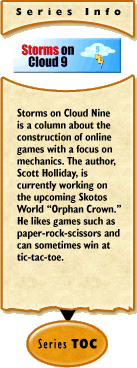
Creativityby Scott Holliday One of my best sources for inspiration during game design is just to take a break and play a different game. Obviously, I can't take ideas concerning theme or story — nor would I want to. However, when a system works really well, it sinks in and gets me thinking. Even better is when something seems badly designed. I can't help but try to figure out what would be a good fix. Seeing problems from the outside is often the best way to fix it from the inside. More importantly, it is much better to fix something during design rather than after the players knock down your door. After playing a variety of online games over the last few years, I've noticed one common theme. The way I originally phrased it is simply, "nothing ever happens." Sure, stuff happens. Generally, players find whatever behavior gives them the best rewards and then continue endlessly. Occasionally, the admins run an event and a couple players turn out. The problem though is that nothing changed. When all is said and done, everybody returns to their standard reward behavior. Perhaps a better phrasing would be, "nothing ever changes," although this is likewise incorrect. Worlds often have massive world-altering modifications. The problem is simply that the players often don't care. They might have to find a new spot to camp, maybe change their behavior slightly, but it generally isn't a real problem. Later on, my interpretation became, "I can't make anything happen." When players try to run their own plots or quests, they run into the same wall. I've run my fair share of events. Kidnapped princesses, alien hunts, diplomacy with vampires, whatever. A few players directly involved will show up. However, the majority of other users will generally just tell you to shut up and get out of their area. Without a developer there to provide "real" incentive, they don't see the point. Part of the problem would be solved by removing level treadmills. With no artificial incentives, real role-playing can flourish. The question is whether it is worth losing (and confusing) the players that won't understand what to do without the treadmill. Worse, without the treadmill, when a plot isn't in action, there is no alternate activity to keep you entertained while you wait. Unless the developers have provided alternate activities... Part of the problem is that players generally have no real way to influence the world. More and more games are giving players the option to buy houses or even build towns. However, this is just an extension of the player. Furthermore, what is the world effect of this? It's generally just another obstacle for other people to go around. The aim should be to give players the tools to make things that are actually considered important. Quests, puzzles, maps, events, monsters. To some extent, this should be the biggest goal for the developer. Getting players involved in the creative process is a great way to add depth to the world, provide constant content upgrades, and keep these player-builders entertained. In fact, after reading Dave Rickey's Engines of Creation and the thread that it spawned, I have my own small comment. :) Finding all four different play-styles is pretty easy in most games. However, there is an additional play-style that has been missed. The builder. The player that wants to create content for other players. I guess you could class him with the achiever or the socializer, but he doesn't really fit with either. Some MUDs that I've played do allow players to get involved. This is usually given after the player has reached the highest levels or demonstrated a degree of social influence on the world. Do you see the contradiction? Skill or tenacity as an achiever, explorer, socializer, or killer has almost no relationship to skill as a builder. It only demonstrates an appreciation of that part of the game. The builder doesn't fit into the usual player definitions and will likely give up in frustration before reaching the top. If you don't provide content FOR builders, you can't expect builders to arise from nothing. On the other hand, developers do need to retain control. Free use of power could quickly get out of hand. Clearly, the former method was just a way to weed out problem cases. However, a better way to build builders would be to look at their work. Assume each player starts with small creative powers — the ability to make unimportant items, perhaps as part of the crafting system? By looking at a player's work, developers could then decide that a player was qualified for greater creative influence. As long as the developer looks through new quests, maps, and events beforehand, the player's effort might even become canon. What better reward for a builder?
|
